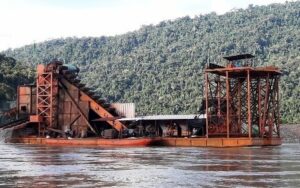Chinese companies have been hiding behind mining cooperatives to extract gold in the northern regions of the department of La Paz, Bolivia. These cooperatives receive an income in exchange for maintaining secrecy. These Chinese companies have been enriching themselves with Bolivian gold without paying taxes, while polluting and damaging the health of locals, Peruvian investigative journalism platform Ojo Público reported.
“The gold issue is not controlled despite the fact that there are regulations to do so, and that the state-owned Bolivian Gold Company exists,” Ely López, a researcher with the Latin American organization Terra Justa, which studies extractive projects and their effects in the region, told Diálogo on January 30. “This issue is beyond the control of the state.”
These “shady deals” have become customary between Chinese investors and national cooperatives, according to Latin American storytelling platform VIST. Chinese investors take up to 75 percent of the value of the gold without paying taxes to the state, Ojo Público reported.
“The Chinese take everything and leave nothing for the people,” a citizen from the La Paz town of Mayaya, who asked to remain anonymous for security reasons, told Ojo Público.
“China helps with the purchase of dredges and machinery to excavate the rivers,” the operations manager of a mine in Guanay, who also asked not to be identified for fear of reprisals, told Mongabay. “The Chinese have a lot of machinery [in Bolivia].”

There are dump trucks from Chinese state-owned China National Heavy Duty Truck Group Co. (CNHTC); machinery from Guangxi LiuGong Machinery Co., a Chinese state-owned company; equipment from CNHTC’s Sinotruk Group; and motorized vehicles from Detank, a manufacturer linked to the Chinese Communist Party, Bolivian newspaper El Deber reported.
According to El Deber, Beijing’s presence is not only seen in the companies and machinery operating on land, but also in the dredgers floating on the river. There are some 20 dredges along the 54 kilometers from Mayaya to the La Paz River. “These are machines that operate at all hours,” the newspaper reported.
Destruction
According to Mongabay, gold is Bolivia’s second most important export. However, illegal gold mining has led to widespread deforestation and mercury contamination. The Bolivian Amazon faces an increasing risk of environmental destruction.
The area of greatest concern is Madidi National Park, a protected area of nearly 19,000 square kilometers with some of the highest biodiversity rates in the Americas, Mongabay reported. The area has become the core of gold mining in Bolivia. Every year, mining activities take place inside the park.
“Because there is the indiscriminate presence of dredgers there is contamination in the rivers due to the use of mercury,” López said. “If the mercury is in the rivers, it’s in the people, the animals, and all the surrounding vegetation.”
There is also “land grabbing by Chinese capital in the region. People have had to flee their communities,” López added.
Pull factor
The illegal extraction of Bolivian gold controlled by mining cooperatives, in association with Chinese companies, could be linked to other illicit activities in northern La Paz, such as drug trafficking and human trafficking, reported Bolivian daily Opinión. They are also involved in the illegal trafficking of mercury to other countries, added Bolivian newspaper Página Siete.
Increased demand for Bolivian gold acts as a “pull factor” for criminals in the region, including organized crime groups involved in financial crime, Interpol indicated in an April 2022 report.
“We have a Bolivia besieged by gold mafias, smuggling, and drug trafficking, which move large amounts of money,” Rodrigo Paz, a senator for the Bolivian political alliance Comunidad Ciudadana (Civic Community), told the press in December.
Guarantor
“We need to work deeply on the issue of regulating mining cooperatives so that we can adapt to take care of Mother Earth,” Víctor Ticona, mayor of Guanay, Bolivia, told Mongabay.
“If at least the regulations linked to the protection of protected areas were respected, it would be a guarantor to avoid indiscriminate mining. But what is being discussed now in Bolivia is to further open up protected areas for mining expansion and exploration,” López concluded. “I don’t see how the situation can change. Maybe with the help of partner countries.”









